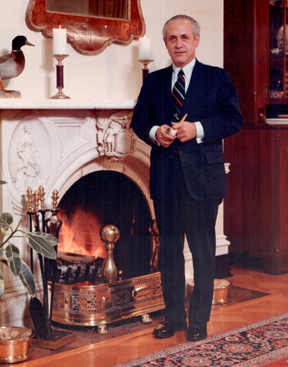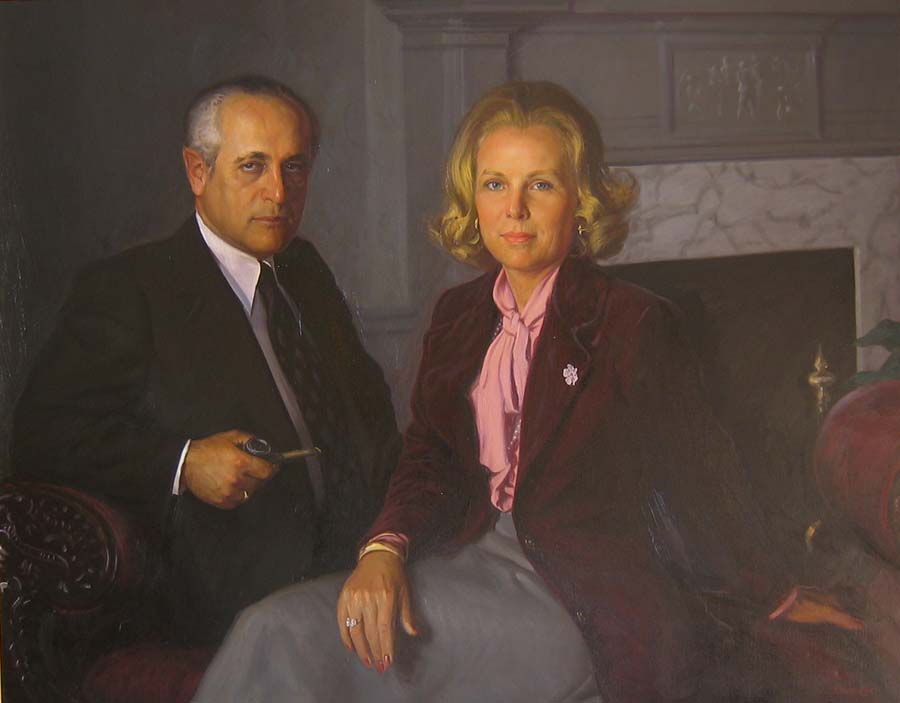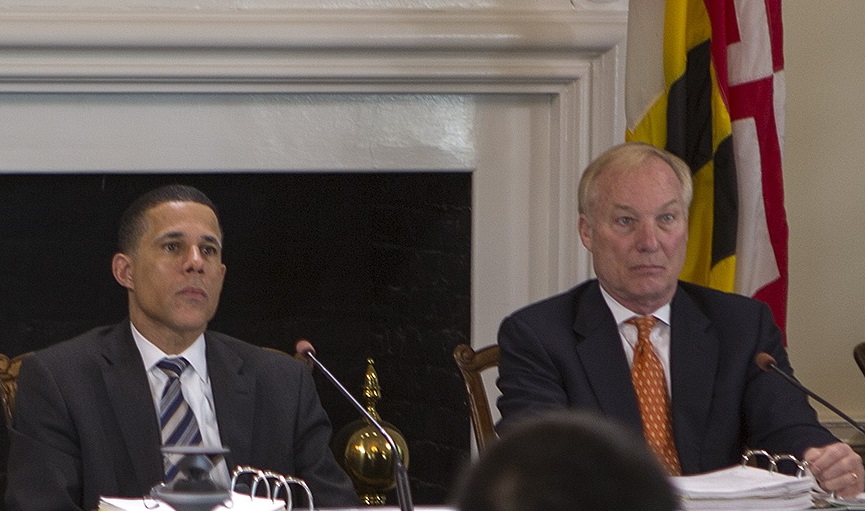Second of two parts. Part 1, Marvin the Magician ran yesterday.
By Barry Rascovar
For MarylandReporter.com
Former Maryland Gov. Marvin Mandel died last week at 95 after a life of enormous achievements and puzzling contradictions.
On the surface he could be wise, funny, kind, brilliant and farsighted. Yet there was a darker side behind the implacable façade he showed to the public.
As governor for ten years, he manipulated legislators better than anyone before or since. Victory after victory, reform after reform piled up.
What we didn’t know was that Mandel also had been manipulating his first wife, engaging in a long-running affair with a blonde femme fatale from Southern Maryland. He devised a convoluted cover-up and denial when the public finally got wind, after his government car was involved in a late-night fatal crash on a mysterious return trip from Southern Maryland.
He also manipulated the media, planting favorable stories about his administration as well as unfavorable stories on his enemies. He delighted in playing word games with reporters at his weekly press conferences — until those very words got him in deep trouble with federal prosecutors.
What came out in two high-profile trials, marked by a health scare and jury-tampering, was the extent of Mandel’s venality.
He was the behind-the-scenes puppeteer, using his power as governor to reward close political friends in return for a slew of financial windfalls he desperately needed — especially to pay for an expensive divorce from his first wife and the expensive tastes of his paramour (and second wife).
How it began

Marvin Mandel in the governor’s office with his ubiquitous pipe. Undated photo, Maryland State Archives.
Little did I know my very first day reporting on the Maryland General Assembly would reveal a key element of Mandel’s manipulations-for-profit.
By the 1972 session’s sine die adjournment 90 days later, it was clear to all that a dark, deep conspiracy was at work — with Marvin Mandel acting as the fulcrum.
Here’s what happened in that fateful General Assembly session.
As set out in the Maryland constitution, vetoed bills were the first order of business. One of those concerned a transfer of 18 racing days from the defunct Hagerstown track to Marlboro, a bedraggled half-mile oval in Prince George’s County.
Mandel had rejected the bill, claiming it was unconstitutional on technical grounds.
Yet when lawmakers took up the Marlboro veto a surprising thing happened.
Marvin Mandel, the State House wizard with near-total control of the legislature, didn’t lift a finger to defend his veto.
Independence Day
First the House, then the Senate overrode the governor’s action, thus doubling Marlboro’s racing days in less than two weeks after the track changed hands.
But no one in the legislature knew about this change of ownership.
Reform Democrats and Republicans mistakenly crowed that legislators finally had stood up to Mandel and taught him a lesson. It was Independence Day for the General Assembly.
More cynical minds saw it quite differently. Something didn’t smell right, they said.
One of those doubters was Bentley Orrick, the Baltimore Sun’s always-skeptical bureau chief. He saved me from my fresh-on-the-job naïveté.
My written version of the Marlboro action for the next day’s newspaper bought into the theme of rebellious legislators standing up to a powerful governor.
Orrick, though, had the good sense to re-write my lead paragraph so it said Mandel had “all but ‘publicly’ acquiesced” to the veto override that doubled Marlboro’s racing days. He knew something was going on behind the gubernatorial curtains.
Thank the stars for Ben Orrick.
Big pay day
We now know Mandel’s cronies were concocting a whopping bonanza for themselves, thanks to Mandel’s actions and non-actions.
When the governor vetoed the Hagerstown-to-Marlboro transfer in the spring of 1971, it sent the price of Marlboro’s stock tumbling.
Thus on New Year’s Eve, Mandel’s close associates secretly bought the half-mile track at a deeply discounted price.
Two weeks later, thanks to Mandel’s unexpected failure to defend his veto, Marlboro had twice the number of racing days. The governor’s pals had doubled the race track’s worth in a blink of a legislative eye.
Throughout that tumultuous 1972 session Mandel continued playing the role of innocent bystander as his friends worked ceaselessly with gubernatorial aides to multiply their race track fortunes.
Out of the blue came a vast racing consolidation bill. It awarded Marlboro a staggering 94 days — more thoroughbred dates than any track in Maryland had ever run before. It amounted to a 500 percent increase in days of racing for a crumbling, small-time track.
The consolidation bill also called for a state buyout of the one-mile Bowie track, with all of Bowie’s racing days — plus Marlboro’s 94 days — transferred to the far more profitable Pimlico and Laurel one-mile tracks.
Marlboro got to keep its night-time harness racing schedule, too.
What an astounding payoff for Mandel’s friends. In less than four months, they would have increased the worth of their recent purchase by nearly $10 million, or $57 million in today’s dollars.
Bit by bit, though, this nefarious profit-making scheme came into public view, thanks to legislative hearings and filings with the Maryland Racing Commission.
Senate resistance
By session’s end, Mandel’s crew had dropped all pretense of disinterest. His lobbyists were pressing legislators hard to pass the consolidation bill.
Yet resistance in the Senate remained intense.
Among the most vehement foes: Steny Hoyer, Jack Lapides, Jervis Finney, Vic Crawford and Manny Emanuel — all on the Senate Finance Committee that eliminated the bill’s worst elements and eventually refused to pass the measure (on two tie votes).
The ever-observant Finney predicted what would take place.
He told his Senate colleagues “on the very last night of the session we’ll be called [by the governor’s lobbyists] and told, ‘you can have your bill’ and ‘you can have your bill’ and ‘you can have [racing] consolidation’ and who do you think is going to be getting all its racing days back – good old Marlboro, coming ’round the track.”
On cue, with less than an hour to go before sine die adjournment Mandel’s chief Senate mouthpiece, Roy Staten of Dundalk, rose to resurrect the racing bill.
Lapides and others started a mini-filibuster. With just ten minutes left before the legal midnight adjournment, Staten tried again to ram the bill through. He failed. Debate persisted for another 20 minutes with Staten pleading for a final, post-midnight vote.
At that point, Lapides tried diplomacy, asking a wavering Senate President William S. James to do the right thing.
“Mr. President,” Lapides politely intoned, “this bill has been properly defeated. . . . The integrity of the Senate is at stake.”
James realized he had no choice, despite the enormous pressure put on him by Mandel. He ruled further deliberations would be “improper.”
No endgame
For the first time in his career as governor, Mandel had been denied a prime objective — though he and his cronies found a way around the legislature, thanks to a pliant racing commission that Mandel controlled.
A year later the Marlboro owners got regulatory permission to shift their 36 racing days to the larger Bowie track. They reaped a nifty $2.1 million profit — $12 million in today’s dollars.
These shenanigans were to form the basis of federal corruption charges against Mandel.
His reward from his pals included a $300,000 share in a lucrative federal building lease (today’s value: $1.7 million); a prime parcel of Eastern Shore land ready for development (today’s value: $200,000); lavish vacation travel and wardrobes, and money to finance his expensive divorce from his first wife and the expensive tastes of his paramour (and later second wife).
The value of these “gifts” from friends, in today’s dollars: nearly $3 million.
Clouded judgment
Mandel’s deceptions and cover-ups, his steadfast refusal to admit any wrongdoing, have clouded the public’s perception of his unmatched contributions to Maryland government.
Did he cross ethical and moral boundaries?
Did he betray the public’s trust?
Elected officials are supposed to provide the public with honest government and honest policy decisions. Was their faith in Mandel misplaced?
Four decades after the fact, those questions still are debated.
Marvin Mandel could have gone into the history books as Maryland’s best governor, an inductee into the national governors’ Hall of Fame.
Instead, he is remembered for his messy divorce; his lies and deceptions; his secretive scheming to enrich his friends; the financial rewards he received in exchange for his underhanded actions, and his incessant denials.
That is the tragedy of Marvin Mandel.
Greatness was within his grasp, but the temptations of love and an elevated lifestyle proved more tempting.
Barry Rascovar’s blog is www.politicalmaryland.com. He can be reached at brascovar@hotmail.com






Recent Comments